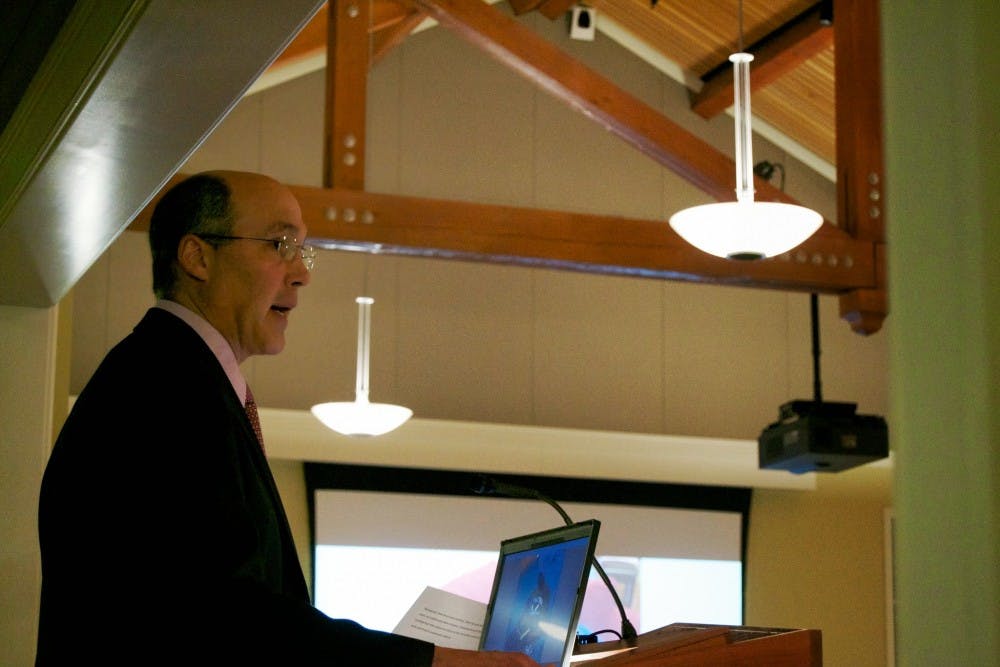Maggie Hannon |
Last weekend, UP hosted the sixth annual Earth Care Summit, a dialogue for faith-based communities and a reflection on environmental ethics. Summit attendees explored different aspects of environmental studies like health, economics, agriculture and faith.
Attendees were encouraged to consider the question, “Who is under your carbon footprint?” As the slogan for the Catholic Climate Covenant, this question encouraged people to think about who suffers the most from climate change. Many scientists predict that citizens of developing nations will take the brunt of climate change problems, presenting an ethical dilemma to consumers in places like the U.S.
The summit’s keynote speaker, Dan Misleh, is the founding executive director of the Catholic Coalition on Climate Change, which is now known as the Catholic Climate Covenant. In his speech, Misleh depicted the journey that Catholics need to take back towards the biblical covenant with God and creation.
“We need today to step back and think about the journey we are on,” Misleh said. “Can we journey back to God from whom we came, but having the latest iPhone, car or clothes? Can we get back to God by burning through non-renewal energy resources? We journey back to God by embracing our brief time on Earth by loving deeply and ignoring the costs of such love.”
Steve Kolmes, chair of the environmental studies department, says religious participation on issues of environmental justice is crucial for a more thoughtful discussion.
“In our society, there’s lots and lots of entities out there that are connected to environmental policy, or politics, or environmental science or conservation,” Kolmes said. “But if you want to find a group in our society today that is focused on ethical reflection, you pretty much have to go to faith-based organizations.”
Kolmes and theology professors Russ Butkus and Carol Dempsey have worked together on the “Theology in Dialogue” series that combine the studies of theology and ecological science. Dempsey said the moral and ecological implications for not acting on climate change are damaging for Catholics.
“It’s unconscionable and lamentable that we cannot see that this problem affects every aspect of life,” Dempsey said. “If we believe in Catholic sacramentality, and the holiness and goodness of all of creation, all the more reason we have no other choice, but to respond ethically.”
Senior environmental science major Dana Coppernoll-Houston found that although people often think there is a disconnect between religion and science, the two fields relate well to each other.
“I guess people think that science and religion are always at opposite ends of some sort of spectrum, but in terms of environmental ethics and taking care of the earth and stewardship… they are heading for the same goal,” Coppernoll-Houston said.
Many environmental science students who attended the event provided their own perspective on the importance of paying attention to environmental problems.
“It’s an important issue and it’s our future, and we don’t want to cut ourselves shorter than we need to,” freshman Victoria Avalos said.
The two-day summit, which was sponsored by Ecumenical Ministries of Oregon, Interfaith Network for Earth Concerns, Oregon Interfaith Power and Light and the University of Portland, had a range of events Sunday afternoon. Among the sessions were a seminar on Pope Francis’ upcoming encyclical (a letter from the Pope that is sent to all of the Catholic Bishops), a resource fair, a keynote speaker and breakout sessions for different topics on environmental justice.
Misleh, Butkus and other panelist participated in a seminar about Pope Francis, speculating about the Pope’s approach to ecology in his upcoming encyclical. Butkus predicted that Pope Francis would include footnotes from previous papal statements from Pope John Paul II and Pope Benedict XVI, while also including what he called “the zingers,” or Pope Francis’ unique and possibly controversial interpretations on climate change.
Breakout sessions from the event included topics like modernizing the Columbia River Treaty, the impacts of climate change on human health and how climate change will affect vulnerable communities.
While much of the summit focused on the implications for humans and future generations, theology professors Butkus and Dempsey talked about the implications of climate change for other living things.
“We have to understand climate change from a transformed consciousness, not only from the human perspective, but from the nonhuman perspective as well,” Dempsey said.
According to Butkus, many people do not consider the extinction of other species.
“Yeah, a lot of people don’t connect that dot,” Butkus said. “But climate change, if it goes the way it’s going now, can render a lot of species extinct.”
Maggie Hannon is a reporter for The Beacon. She can be reached at hannon15@up.edu.








